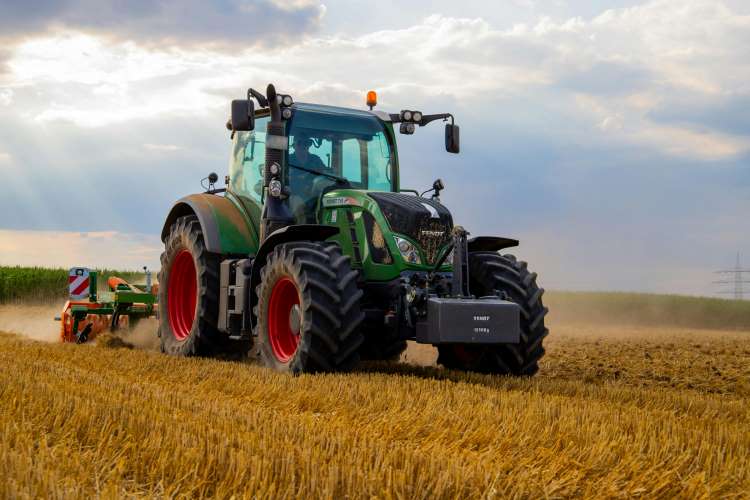Recently, more than 200 farmer unions took to the streets raising various demands, including the legalisation of the minimum support price and a complete loan repayment waiver. The agitation has been triggered by a deep distress in agriculture sector, accentuated by extreme climate conditions that have significantly affected labour and crop productivity. To address the climate impact on agriculture productivity, there is a need to adopt environmentally friendly production and processing methods. In the farming sector, electric tractors represent a promising alternative by reducing production costs and emissions.
The agricultural sector, despite its vital role in the economy, significantly contributes to environmental pollution. While, diesel-engine tractors and water pumping equipment are major culprits in this, activities such as fertilizer application, pesticide use, and animal waste management also contribute to air, water, and soil pollution. Emissions from fertilizers and burning agricultural residue harm public health and contribute to climate change, while excessive use of fertilizers and pesticides contaminate water sources, affecting aquatic ecosystems and human health. Also, improper management of agricultural waste degrade soil fertility, impacting crop yields and overall sustainability.
Diesel-powered machinery, notably tractors, accounts for approximately 12-18% of the total cost of agricultural production, which varies by crop type and geographical region. This cost is crucial in determining the MSP. The introduction of electric tractors could lead to substantial fuel cost savings, effectively addressing uncertainties in crop pricing dynamics.
READ I Cold chains, quality keys to rebooting agriculture trade
Electric tractor can cut emissions
According to the ministry of environment, forest, and climate change, the agriculture sector accounts for nearly 14% of India’s total greenhouse gas emissions, with diesel-powered machinery being a major contributor. Tractors account for about 7.4% of India’s annual diesel consumption and contribute to nearly 60% of agriculture fuel usage, increasing the sector’s heavy reliance on diesel.
Amid these challenges, electric tractors offer hope. They promise not only reduced operational costs but also a sustainable solution for emissions reduction. Additionally, they can serve as power banks for various purposes and during grid failures. With subsidised electricity costs for agriculture, transitioning to electric tractors presents a viable opportunity to address economic and environmental concerns simultaneously.
Greenhouse gas emissions from agriculture
Electric tractors offer a promising solution to mitigate pollution and enhance sustainability in the agricultural sector. Electric tractors produce zero tailpipe emissions, contributing to cleaner air and improved public health, helping the country align itself with sustainable development goals. However, adoption of electric tractors requires addressing challenges such as initial cost, infrastructure development, and promoting their use amongst farmers.
Electric tractors also have several advantages over diesel models, including fewer moving parts, resulting in minimal maintenance, lower service costs, and reduced downtime. A study by the Indian Agricultural Research Institute (IARI) suggests that electric tractors could reduce maintenance costs by up to 40% over their lifetime, offering a more reliable and cost-effective alternative for farmers. However, realising the full potential of electric tractors requires concerted efforts and policy interventions.
Regulatory framework
Despite being the world’s largest manufacturer of tractors, India has seen slow adoption of battery-operated agricultural tractors in the past five years. A regulatory framework for electric tractors could jumpstart the market, fostering an environment for mass adoption and positioning India as a global exporter of electric tractors.
There is an urgent need to integrate electric tractors into electric vehicle (EV) policies across states. While Punjab has led by including tractor subsidies in its EV policy, other key agricultural states should follow this approach to promote sustainable agricultural practices.
Developing and certifying testing and quality assurance standards for electric tractors can attract manufacturers to this sector, addressing supply-side constraints. Institutes like the Central Farm Machinery Training & Testing Institute can set manufacturing, operational, and performance standards for various electric tractors based on power output, design, and usage purpose.
Infrastructure development
Investing in charging infrastructure for electric tractors, especially in rural areas, is crucial for the rural economy’s contribution to India’s development goals by 2047. Using CSR funds for this purpose and establishing a charging station network with incentives will ensure widespread accessibility and convenience for farmers.
Introducing electric tractors into custom hiring centres for agricultural machinery could substantially increase demand as farmers begin to experience their benefits. This initiative would also mitigate challenges related to charging and maintenance. Piloting this approach and scaling based on farmer feedback would be prudent.
Investments in R&D, training
Allocating funds for R&D in electric tractor technology will drive innovation, improve efficiency, and reduce costs. Encouraging collaboration between government agencies, agricultural research institutions like the Indian Council for Agricultural Research, and the private sector would accelerate technological advancements in the sector.
Training and skill development initiatives for farmers, technicians, and service providers on electric tractor operation, maintenance, and repair are essential. Empowering stakeholders with the necessary knowledge and skills will facilitate the transition to electric tractors and ensure their effective use in agricultural operations.
Launching promotional campaigns and awareness programmes to educate farmers and the public about the benefits of electric tractors, including cost savings, environmental sustainability, and technological innovation, is crucial. Highlighting successful case studies and pilot projects can demonstrate electric tractors’ effectiveness in real-world scenarios.
Introducing a regulatory framework for electric tractors presents a strategic opportunity for India to leverage its manufacturing capabilities, drive innovation, and emerge as a global leader in sustainable agricultural machinery. By seizing this opportunity, India can enhance its economic competitiveness and play a pivotal role in shaping the future of agriculture globally. This approach could provide solutions to achieving net-zero emissions, strengthening the rural economy, and improving agricultural economics.
(Priyadarshini Alok and Akash Sharma work at CUTS International, a global public policy research and advocacy group.)

